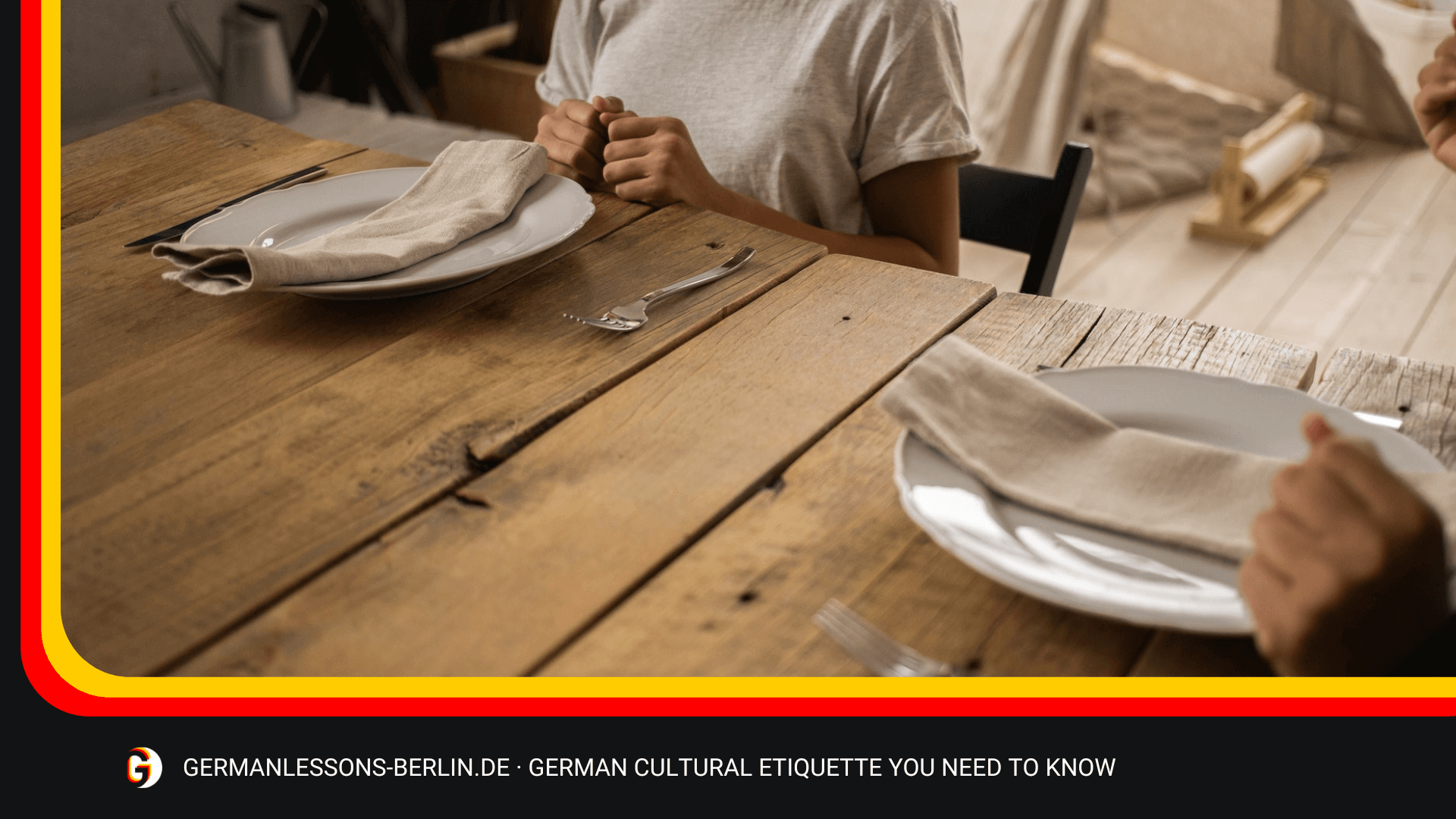Do you plan on traveling to Germany, or interacting with German people? If so, it’s important that you familiarize yourself with the country’s cultural etiquette. From first impressions to table manners, there are many things to consider when engaging in conversations and activities with Germans. Here is an introduction to some of the essential customs you should know before your arrival.
The first step when making a good impression is understanding how to address someone properly. In Germany, they use formal titles like “Herr” for men and “Frau” for women until told otherwise. It’s also important to remember that names are usually preceded by their title like Herr Müller instead of just Müller. And don’t forget about handshakes! A firm handshake upon meeting someone new is expected in most professional settings- but keep it brief!
Another key aspect of German culture revolves around food and dining habits. Dining out requires more formality than in other countries, with guests often being expected to dress up more formally compared to casual wear elsewhere. Table manners are also quite different from those found in America; it’s not uncommon for people at large events or dinners to wait until everyone has been served before beginning the meal together.
Keep reading to find out more about German cultural etiquette you need to know!
Table of Contents
Greetings And Gestures
Greeting etiquette is an important part of German culture. Handshake etiquette is a common form of greeting and involves some special rules, such as shaking hands with everyone present upon meeting them. It’s polite to maintain eye contact while doing so and the handshake should be firm but not too vigorous. Verbal greetings are also essential in Germany; saying “hello” or “good day/evening” when entering any room or space will help show respect for others. Body language and facial expressions are two other components that can impact how people interact with each other during verbal exchanges. Smiling is encouraged during conversations, though it’s important to know when smiling is appropriate – laughing loudly may be seen as inappropriate in certain situations. To make sure you appear respectful while conversing with someone, use positive body language like nodding your head and keeping your arms uncrossed, which indicates openness to communication. All these elements combined together create a friendly environment that reflects good manners and cultural sensitivity in Germany.
Attire And Appearance
In Germany, attire and appearance are taken very seriously. The dress code is generally quite formal when compared to other countries. It’s important to note that fashion trends are considered less important than adhering to a conservative style. Here’s how you can make sure your wardrobe matches the German cultural etiquette:
| Clothing Etiquette | Description |
| Formal Dress | Men should wear collared shirts with trousers or khaki pants; suits are preferred but not always necessary. Women should opt for dresses or skirts of knee length as well as blouses, sweaters, and jackets in neutral colors. It’s also expected that footwear be closed-toe and covered. While attending formal events, it is appropriate for both men and women to don dark colored suits or evening gowns depending on the occasion. |
| Casual Clothing | Casual clothing is still expected to look neat and clean though relaxed styles such as jeans and T-shirts may be acceptable in some settings. Avoid wearing shorts unless engaged in physical activity or when visiting a beach town during summertime. Additionally, avoid flip flops which aren’t often seen as an acceptable form of footwear outside of beaches or swimming pools. Lastly, personal hygiene should never be overlooked since this will have an effect on one’s overall presentation regardless of what type of outfit one chooses for any given situation. Make sure clothes are ironed properly, shoes polished if needed and hair combed neatly before leaving home each day so that respect can be shown through appearance at all times while interacting with people from Germany. |
Table Manners
Table manners are a very important part of German culture. Knowing the correct etiquette at the dinner table will make you feel more comfortable in social situations and show respect to those around you. Here is an overview of some common dining habits that should be followed while eating in Germany:
| Table Manners | Dining Etiquette | Eating Habits |
| Wait until everyone has been seated before beginning your meal. | Always keep your elbows off the table when not eating or drinking. | Do not begin eating until everyone has their food and the host has said “Guten Appetit” (Enjoy). |
| Use utensils to eat whenever possible, even if it’s just bread and butter. | Pass all dishes from left to right around the table during meals. | Make sure to finish everything on your plate as leaving food unfinished is considered impolite. |
| All forks and knives should point down towards your plate while eating with them. | When finished, place knife and fork side by side diagonally across your plate to indicate you have completed your meal. | Chew quietly without making too much noise and don’t talk with food in your mouth. |
It may seem like a lot of rules to remember, but once you understand these customs they become second nature. Being aware of proper etiquette can help lead to good conversations over a shared meal which is essential for connecting people together regardless of language barriers or cultural differences. Eating properly shows respect for one another so take note next time you sit down for a meal!
Conversation Etiquette
When it comes to conversation etiquette, Germans are generally quite formal. It’s important to remember that small talk is often seen as a waste of time and unnecessary. Therefore, when engaging in conversations with German people, stick to business-related topics or issues related to the present occasion. When initiating a conversation, avoid using questions such as “How are you?” and instead focus on more relevant topics like news or current events. Furthermore, try not to interrupt someone while they are talking; this counts as rude behavior in Germany.
In addition to refraining from interruption, be mindful of practicing good listening etiquette when conversing with Germans. This includes maintaining eye contact throughout the discussion and respecting their opinions without any judgement or criticism. Moreover, make sure your contributions add value by being meaningful and well thought out; simply speaking for the sake of filling gaps may come off as insincere or uninteresting.
By understanding these conversation rules and applying them during interactions with Germans, one can guarantee successful communication exchanges which will leave both parties feeling respected and appreciated.
Gift-Giving Protocols
Gift-giving protocol is an important part of German culture. It’s customary to give a present when visiting someone in their home or being invited out for dinner. There are some rules and etiquette one should keep in mind while giving presents in Germany:
- Present etiquette requires that gifts be given at the beginning of a visit, so it’s best not to wait until you’re leaving to offer something.
- Appropriate gifts usually consist of items such as flowers, chocolates, cookies, wine, books and small trinkets like jewelry – but always try to personalize your gift ideas according to who you’re giving them too!
- Giving tips is always appropriate if you’re dining out or attending any kind of event where services were provided, although it isn’t expected nor required.
No matter what type of present you give in Germany, remember that thoughtfulness and appreciation will go a long way!
Social Interaction Expectations
When it comes to social interaction expectations, German culture is quite formal. Social norms and expectations should be respected in order to maintain a good relationship with others. It’s important to remember that Germans are not overly familiar or informal when greeting someone; they tend to stick to their cultural norms and expect the same from you.
It’s customary for men and women alike to greet each other with a handshake upon meeting, though some may offer one kiss on the cheek as well. When shaking hands, keep your grip firm but don’t squeeze too hard – this could be seen as aggressive behavior. Additionally, make sure you look people in the eye while speaking and always address them using titles such as Herr (Mr.) or Frau (Mrs.). Avoid using first names unless given permission by the person themselves.
In Germany, punctuality is considered very important. Arriving late can give off a negative impression of yourself so if you’re invited somewhere try your best to arrive on time or even early if possible! In terms of conversations, make sure you listen more than talk since conversation isn’t typically encouraged until after getting acquainted with someone new. Overall, understanding and respecting these cultural norms will help you build strong relationships with those around you!
Public Behavior Guidelines
Public behavior guidelines in Germany vary from other countries. It is important to understand the public behavior expectations, norms, and rules before visiting or living in Germany.
When out in public, it is polite to use formal language when speaking with locals. Greetings should be done with a handshake and direct eye contact. Germans value punctuality so being on time for appointments is greatly appreciated. You may also see that people dress more formally than in many other parts of the world; this includes avoiding wearing shorts outside as well as covering up tattoos and piercings.
In restaurants and bars, pay careful attention to how you order food and drinks as there are certain courtesies expected among customers such as never asking for tap water (unless specifically requested). Tipping practices will also differ from what may be customary elsewhere; typically leaving 5-10% of your total bill is sufficient enough although some establishments will include service charges already into their bills.
It’s always wise to research local customs prior to traveling so that travelers can have an enjoyable experience without offending those around them. A good way to ensure this is by observing the behavior of native citizens and following suit accordingly.
Respect For Elders
Respecting elders is a cornerstone of German culture. As such, it’s important to remember that when interacting with elderly people, you should always show them respect and consideration. It’s expected for younger generations to treat their seniors in an honorable manner no matter what the context or situation may be. This includes offering your seat on public transportation, greeting them first, speaking respectfully to them and following instructions from older adults if they are giving guidance.
It’s also customary to refer to elderly people by their formal titles such as ‘Herr’ (Mr) or ‘Frau’ (Mrs). Younger Germans often use these titles even when talking about relatives who are over the age of 65. Furthermore, you should avoid asking personal questions unless given permission by the senior citizen concerned. For instance, inquiring into someone’s medical condition can be considered intrusive and rude. Finally, respecting one another regardless of age is essential in order to maintain strong social relationships within Germany.
Local Customs
Moving on from the importance of respecting elders, it’s also important to understand German local customs. Every country has its own unique cultural norms and values and Germany is no different in this regard. When visiting or living in Germany, it’s wise to familiarize yourself with some of the more common cultural traditions and language etiquette.
It’s useful to learn about typical German food as part of understanding their culture, as well as being aware that Germans are often punctual and value a strong work ethic. It can be helpful to know how people in Germany interact with one another socially – for example, shaking hands when meeting someone new or not interrupting others while they’re speaking. Additionally, casual dress is typically accepted most places outside formal business settings so you don’t need to worry too much about dressing up if your plans aren’t particularly fancy.
Language etiquette is also an important aspect of learning proper German culture – usually any form of communication should start with saying ‘Guten Tag’ (good day) first before asking questions or introducing oneself. Being polite by using ‘bitte’ (please) and ‘danke’ (thank you) goes a long way since politeness is highly valued within the country. Taking all these various aspects into account will help make sure you experience the best that German culture offers during your visit!
Apology Etiquette
In Germany, apologising is an important cultural etiquette to know. Apologising properly in German follows certain customs and protocols that need to be observed. It’s expected that you will apologise if you make a mistake or offend someone else, regardless of how small the mistake may have been.
When making an apology in German, it’s considered polite to use formal language such as ‘Ich bitte um Entschuldigung’ rather than informal phrases like ‘Tut mir Leid’. This phrase means ‘Please excuse me’, but there are other ways to express your regret depending on the context of the situation. You can also say something like ‘Es tut mir sehr leid’ which translates to ‘I’m very sorry’.
You should always ensure that when offering an apology in Germany, it comes from both your heart and mind. Showing genuine remorse for your actions is much appreciated by Germans, and they will likely appreciate seeing that you put effort into expressing your regret over what happened.
Frequently Asked Questions
What Is The Best Way To Address A German Person When First Meeting Them?
When you first meet a German person, it is important to know the best way to address them. The manner in which you greet someone can have an impact on their opinion of you and set the tone for any further interaction. Here are some tips for addressing Germans when meeting them for the first time:
– Use a formal greeting such as “Guten Tag” or “Hallo”, followed by their title (Herr/Frau) and surname;
– Shake hands firmly but not too aggressively;
– Address people with respect and courtesy.
It’s also helpful to remember that most Germans prefer to use titles even among close friends, so if they introduce themselves with their title and last name, try to do the same when speaking back to them. If you make a mistake while addressing someone, don’t worry – be polite, apologise quickly, and move forward with your conversation. Showing humility goes a long way! Additionally, it’s always better to err on the side of formality rather than being too casual or overly familiar from the start – this will help avoid offending anyone unintentionally.
The key takeaway here is that getting off on the right foot in Germany means respecting social norms like proper etiquette and manners– both online and offline! By taking the time to understand how best to interact with German people when first meeting them, you’ll create positive relationships more easily and enjoy successful interactions during your stay in Germany.
What Are The Most Appropriate Clothing Styles In Germany?
When it comes to fashion, Germans take their dress codes seriously. Whether you are visiting Germany or interacting with German people, understanding the traditional and appropriate clothing styles is essential for making a good impression. Here’s a look at some of the most important guidelines for dressing in accordance with German cultural etiquette.
First off, keep in mind that casual-wear such as jeans and trainers (or sneakers) are acceptable in most settings. However, there are certain occasions where more formal attire may be expected:
– When attending religious services
– Visiting government offices
– Dining out at nicer restaurants
In terms of traditional clothing styles, men should generally stick to classic suits and shirts with conservative ties. Women often opt for skirts or trousers paired with blouses and jackets. As far as colors go, lighter shades tend to be favored over bright or neon tones; earthy hues like navy blue, browns and grays will fit right into Germany’s fashion landscape. It’s also worth mentioning that many Germans aren’t adverse to wearing shorts – just not too short!
For both genders, accessories can really complete an outfit and make it stand out from the crowd – but always remember to keep them tasteful! Jewellery should be worn sparingly while scarves and hats can add stylish flair without going overboard on showiness. In general, when putting together your outfits try sticking to neatness and subtlety above all else – this way you won’t have any problems fitting into German culture’s sartorial expectations.
What Is The Typical Etiquette For Eating Out In Germany?
When it comes to eating out in Germany, there are certain etiquette rules that one should take into consideration. Dining customs and restaurant manners play a significant role in German culture, so understanding the basics of food etiquette is essential for anyone dining out in Germany. Here are some tips on what to expect when you’re eating out in this country:
– When entering the restaurant, wait to be seated by a staff member before sitting down.
– It’s common to keep your hands visible while eating; don’t rest them under the table or put them in your lap.
– If you need something from a waiter or waitress, make eye contact and raise your hand slightly, rather than calling out their name loudly across the room.
– Wait until all dishes have been served before beginning to eat – once everyone has started, feel free to dig in!
In general, it’s polite not to talk with your mouth full during meals and always remember to say ‘please’ (bitte) and ‘thank you’ (danke). Moreover, it’s considered rude if you leave food on your plate after finishing a meal – try to show appreciation for the food by clearing everything off your dish unless otherwise specified by the server. Lastly, unlike other countries such as France where diners often linger over coffee and dessert at restaurants for hours afterwards, Germans usually finish up quite quickly after they’re done eating main courses.
Given these guidelines, following proper dining etiquette can help ensure an enjoyable experience when visiting Germany!
What Topics Of Conversation Should Be Avoided In Germany?
Having an understanding of the culture and etiquette in Germany is important when engaging with locals. As such, it’s essential to know what topics should be avoided in conversations. Knowing what not to talk about can help you have a pleasant conversation that follows German social customs.
When talking with someone from Germany, steer clear of discussing anything related to politics or religion. These two topics are generally considered taboo for polite conversations as they often lead to heated debates and uncomfortable situations. Additionally, avoid bringing up any issues regarding sensitive historical events like World War II or the Holocaust as these can also create awkwardness. It may be best to stay away from any controversial matters altogether if possible.
In terms of other things you should keep out of German conversations, try your best not to criticise anyone’s lifestyle choices or beliefs – even if it’s just intended as light-hearted banter or jokes. Germans take their cultural etiquette seriously so politeness is paramount within most interactions. Respect their beliefs and values by refraining from making insensitive remarks; this will leave a good impression on them and make them more likely to open up in future conversations.
It’s always wise to do some research before travelling abroad so that you’re knowledgeable about the local culture and its associated social conventions. Doing so will ensure that you don’t end up accidentally offending anybody during your trip – allowing you to enjoy your time interacting with people who live in Germany without feeling embarrassed!
Are There Any Special Traditions Associated With Gift-Giving In Germany?
Gift-giving is an important part of German culture, and there are several traditions associated with it. German gift-giving etiquette can vary depending on the occasion or person receiving the gift. Although some may think that simply giving a present to someone is sufficient, knowing the cultural requirements surrounding gifts in Germany will ensure they receive appropriate respect while also demonstrating your knowledge of local customs.
In general, when gifting something to Germans, it’s best to be thoughtful and practical. Gifts should be presented nicely – wrapped if possible – and accompanied by a card expressing good wishes for the recipient. In addition to traditional presents such as flowers or chocolates, items like books or tickets for events might be well received too. When attending a dinner party, bringing wine or cake is usually appreciated.
When exchanging gifts between family members and close friends during special occasions like birthdays or Christmas, more expensive items given with heartfelt intentions are encouraged instead of token gestures. It’s worth considering what recipients would appreciate; regardless of price tag, consider carefully before buying something that has meaning behind it rather than settling for generically available products from stores. The thoughtfulness behind each gift will always have greater significance than its monetary value alone in Germany’s gift-giving tradition.
Gifting others respectfully with consideration towards their culture is essential in any country – especially so in Germany where people take pride in their heritage and values derived from centuries of history and development into modern times. Whether you’re visiting for business purposes or leisurely travel, familiarizing yourself with these customs will show your appreciation for another nation’s culture and make sure everyone has a pleasant experience overall!
Conclusion
When it comes to German cultural etiquette, there are a few important things you should know. First off, when first meeting someone in Germany it’s best to address them with their title and surname. It’s also important to dress modestly – avoid bright colors or overly revealing clothing styles. Eating out follows similar rules as other countries: always say please and thank you, don’t start eating until everyone is served, only use the utensils given for each course, etc. Conversation topics should be generally positive; steer clear of religion, politics and money matters unless directly asked about them by your host. Lastly, make sure to follow any special traditions associated with gift-giving. Germans tend to prefer thoughtful gifts that have been carefully chosen rather than something expensive or flashy.
Overall, following these guidelines will help ensure you demonstrate respect for German culture while avoiding embarrassing faux pas! With some attention paid to detail and an open mind towards different customs and practices, anyone can easily navigate the intricacies of German cultural etiquette with grace and poise!




